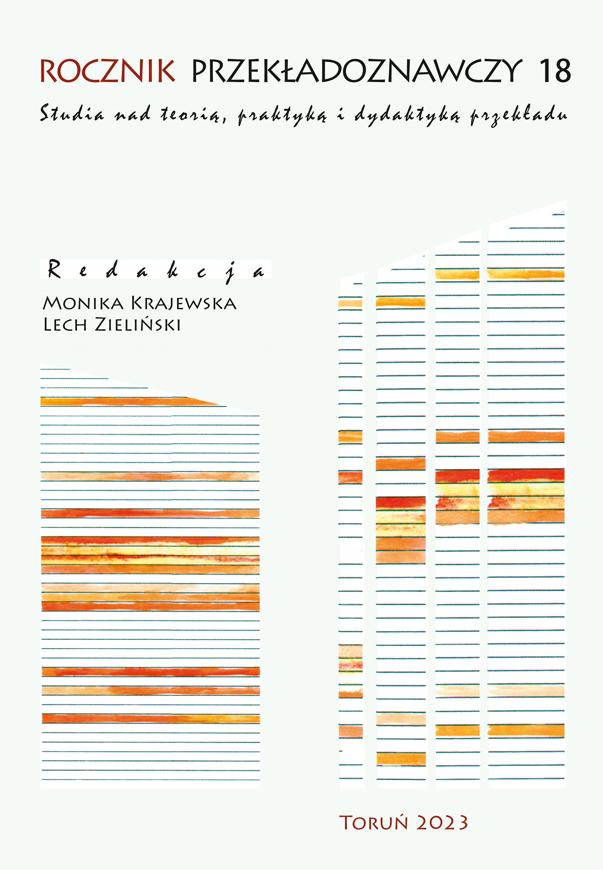Biografia translatorska a mikrohistoria
Przyczynek do historii tłumacza literackiego
DOI:
https://doi.org/10.12775/RP.2023.005Słowa kluczowe
mikrohistoria, tłumacz literacki, biografia translatorska, Hamlet, dziewiętnasty wiekAbstrakt
Mikrohistoria jest praktyką historiograficzną mającą na celu zbadanie elementu indywidualnego, tak aby dopełnić historię ogólną o fakty i wnioski, które mogły zostać poddane nadmiernej generalizacji lub zostać pominięte przy badaniach ogólnych wątków historycznych. Autorka podejmuje rozważania, czy jest to metoda możliwa do wykorzystania w badaniach nad tłumaczem literackim. Do zrekonstruowania mikrohistorii polskich tłumaczy Hamleta pracujących w latach 1797-1939 wykorzystane zostały istniejące już biografie translatorskie. Dzięki wspólnym wytycznym, według których powstały, możliwe stało się ich porównywanie i analizowanie. To z kolei pozwoliło odpowiedzieć na pytanie, kim jest dziewiętnastowieczny tłumacz Hamleta.
Bibliografia
Bassnett S., Lefevere A., 1998, Constructing cultures: Essays on literary translation, „Multilingual Matters”, 11, s. 123-139.
Budrewicz-Beratan A., 2009, Stanisław Egbert Koźmian. Tłumacz Szekspira, Kraków. Cetera-Włodarczyk A., Kosim A., 2019, Polskie przekłady Shakespeare’a
w XIX wieku. Część I. Zasoby, strategie, recepcja, Warszawa.
Chmielowski P., Krzemiński S. (red.), 1985, Julian Korsak, [w:] Chmielowski P. (red.), Złota przędza poetów i prozaików polskich, ze słowem wstępnym Józefa Ignacego Kraszewskiego, T. 2, Warszawa.
Dakowska M., 2007, Teaching English as a foreign language. A guide of Professionals, Warszawa.
Domańska E., 2005, Mikrohistorie. Spotkania w międzyświatach, Poznań.
Eberharter M., 2021, Translator biographies as a contribution to Translator Studies. Case studies from nineteenth-century Galicia, [w:] E. K Kaindl, W. Kolb, D. Schlager (red.), Literary Translator Studies, Amsterdam, s. 73-88.
Głąb G., 2014, Powstanie Styczniowe w tekstach Jarosława Iwaszkiewicza, „Niepodległość i Pamięć”, 21/1-2 45-46, s. 293-316.
Gregorewicz D., 2014, Mikrohistoria - otwieranie nowych horyzontów, https://histmag.org/Mikrohistoria-otwieranie-nowych-horyzontow-9621 (dostęp: 4.11.2022).
Hasło: Pochodzenie, [w:] Wielki Słownik Języka Polskiego, https://wsjp.pl/haslo/podglad/11190/pochodzenie/5005475/szlacheckie (dostęp: 11.11.2022).
Kaindl K. E., Kolb W., Schlager D. (red.), 2021, Literary Translator Studies, Amsterdam.
Kaindl K. E., 2021, (Literary) Translator Studies. Shaping the field, [w:] K. E. Kaindl, W. Kolb, D. Schlager (red.), Literary Translator Studies, Amsterdam, s. 1-40.
Komorowski, J., 1992, „Hamlet” Williama Shakespeare’a, Warszawa.
Maleczyńska K., 1987, Książki i biblioteki w Polsce okresu zaborów, Wrocław.
Makarska R., 2014, Die Ruckkehr des Ubersetzers. Zum Nutzen einer Ubersetzerbiographie, [w:] A. F. Kelletat, A. Tashinski (red.), Ubersetzer als Entdecker, Berlin, s. 51-61.
Makarska R., 2016, Am Beispiel von Siegfried Lipiner (1856-1911) und Grete Reiner (1892-1944), [w:] A. Kelletat, A. Tashinsky, J. Boguna (red.), Ubersetzeforschung. Neue Beitrage zur Literatur- und Kulturgeschichte des Ubersetzens, Berlin, s. 213-219.
Medick H., 1996, Mikrohistoria, w: Historia społeczna, historia codzienności, mikrohistoria, Warszawa, s. 59-77.
Mokrzycka-Pokora M., Wojciech Bogusławski, https://culture.pl/pl/tworca/wojciech-boguslawski (dostęp: 2.11.2022).
Lanaro P. (red.), 2011, Microstoria. A venticique anni da L’eredita’ immateriale, Mediolan.
Pym A., 2009, Humanizing Translation History, „Hermes - Journal of Language and Communication Studies” , nr 42, s. 23-45.
Ronowicz R., 1982, Kierunki w metodyce nauczania języków obcych, Warszawa.
Sadkowski W., 2002, Odpowiednie dać słowo słowu. Zarys dziejów przekładu literackiego w Polsce, Warszawa.
Sadowski L., 1988, Polska inteligencja prowincjonalna i jej ideowe dylematy na przełomie XIX i XX wieku, Warszawa.
Skrzypczak B. Zdzisław Skłodowski, Z naszych wyborczych i społeczno-politycznych stosunków, [w:] Muzeum Narodowe w Kielcach, https://mnki.pl/pl/obiekt_tygodnia/2017/pokaz/238,zdzislaw_sklodowski__z_naszych_wyborczych_i_spolecznopolitycznych_stosunkow,1 (dostęp: 11.11.2022).
Sosnowski M., 2015, Jan Kasprowicz. Opowieść biograficzna. Część pierwsza. Chłopska sukmana (1860-1889), Zakopane.
Wolf M., 2007, Introduction: The emergence of a sociology of translation, [w:] Wolf Michaela, Fukari, Alexandra (red.), Constructing a Sociology of Translation, Benjamins, Amsterdam, Philadelphia, s. 1-36.
Zimbardo G. P., Gerring J. R. (red.), 2012, Psychologia i życie, Warszawa.
Żarnowski J., 1964, Struktura społeczna inteligencji w Polsce w latach 1918-1939, Warszawa.
Żyromski M., 2000, Dziewiętnastowieczna rodzina polska, „Roczniki socjologii rodziny”, XII, Poznań, s. 173-188.
Pobrania
Opublikowane
Numer
Dział
Licencja
Prawa autorskie (c) 2024 Karolina Siwek

Utwór dostępny jest na licencji Creative Commons Uznanie autorstwa – Bez utworów zależnych 4.0 Międzynarodowe.
Statystyki
Liczba wyświetleń i pobrań: 933
Liczba cytowań: 0



